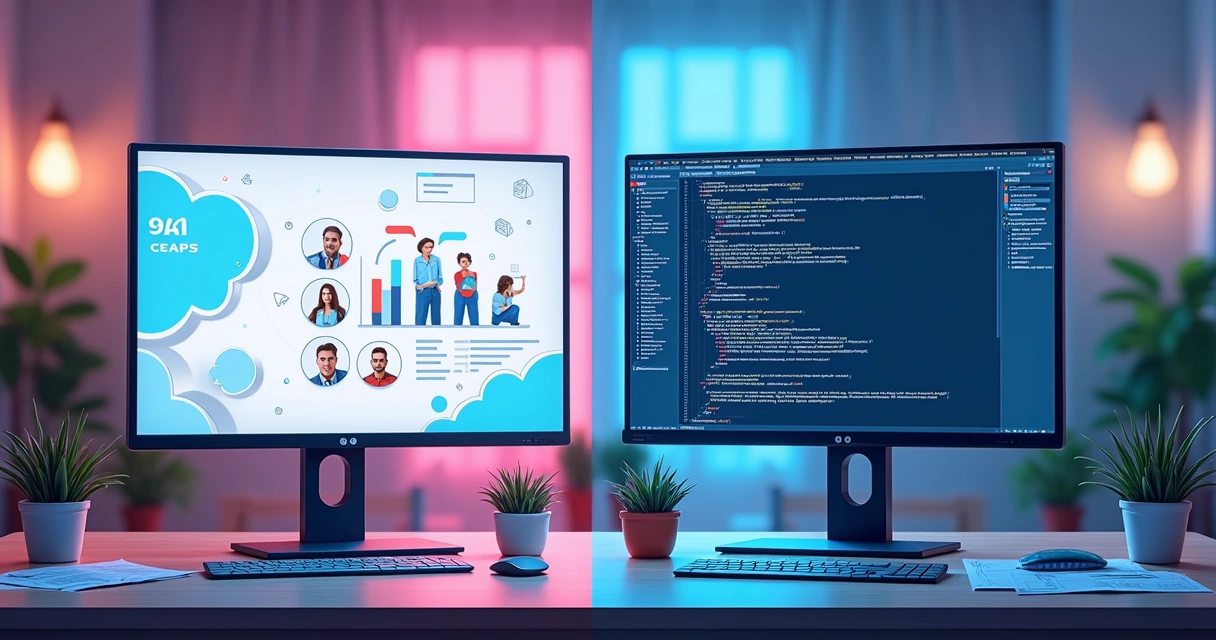Digital projects have never been so accessible. Every year, business owners and tech founders face a question that can make or break their future plans: Should I use SaaS or build custom software in 2025?
It’s a classic fork in the road. While both paths can power your startup, automate workflows, or manage users, each has its quirks and surprises. At DeMeloApps, we see this decision play out with entrepreneurs, founders, and leaders who ask for guidance, hoping to get it right the first time.
There's rarely a one-size-fits-all answer.
What matters is what fits you. To help you choose wisely, let’s discuss 7 factors that shed light on the SaaS vs custom dilemma for the year ahead.
Business needs and complexity
It can be tempting—so tempting—to grab a ready-made SaaS tool and start rolling. For simple needs and common business processes, that’s often enough. Need an invoicing tool? A scheduling app? SaaS offers solutions with minimal setup time.
But sometimes your idea or workflow doesn’t fit the usual mold. You want something unique. Maybe your business model bends the rules. Or you hope to launch a digital product with features no one else has.
- If you need a standard tool for routine tasks, SaaS is quick and flexible.
- If your vision includes processes or user experiences you can’t find anywhere else, custom software from a team like DeMeloApps becomes more attractive.
Fit follows need, not hype.
Budget now and costs over time
The sticker shock of software projects can be real. SaaS often looks cheaper: pay a low monthly fee and go live in hours. For many, this makes SaaS feel safe and budget-friendly, especially for startups and new projects.
But custom software isn't always out of reach—especially if you're thinking long-term or scaling fast. Upfront costs are higher, but you escape the growing monthly fees, per-user charges, and upgrade costs that add up over years with SaaS. And if you want to tweak anything at all, a custom build lets you control those expenses directly.
- SaaS: Lower upfront cost. Predictable subscriptions. Potential for price hikes or unexpected add-ons.
- Custom software: Higher upfront investment. Ongoing support is needed, but you set the terms and own your technology.
Sometimes, a custom MVP built by DeMeloApps costs less over three years than a sprawling SaaS stack in the same period. Think beyond month one.
Speed to launch
Timing matters. Some businesses need to move now. SaaS is famous for quick starts—sign up, set a password, and you’re in business. If all you need is a proven solution off the shelf, SaaS is tough to beat for brute speed.
For a unique digital product (think new app or web platform), a custom solution adds time. That’s the trade-off for tailored features and personalized design. With experienced developers, an MVP can still go live surprisingly fast—weeks, not years.
- SaaS: Instantly or in a few days, once you configure everything.
- Custom: Weeks to months, but you get exactly what your idea needs. With DeMeloApps, rapid prototyping helps move from idea to reality sooner than some expect.

Control and flexibility
With SaaS, you’re working inside someone else’s toolbox. You get updates, but you also get limits. Want a field added? Maybe yes, maybe no. Need a special dashboard or to connect with another tool? You might be stuck or forced to pay for integrations.
Custom development lets you make the rules and shape every piece to fit. You decide features, data structure, integrations, and branding. Plus, if your needs change, the software can evolve with you, not the other way around.
You control the roadmap. Not a vendor.
Data privacy and security
In 2025, sensitive data is called “digital gold”—and protecting it is non-negotiable. SaaS offers robust security for most users, but your data lives offsite, managed by someone else. If you work in healthcare, education, or with personal data, this matters deeply.
A custom setup, hosted on dedicated servers or cloud with strict access rules, puts you in control. DeMeloApps, for example, helps clients build portals and apps with privacy as a foundation, not an afterthought.
- SaaS: Relies on vendor’s compliance and security tools.
- Custom: Design the security checks—own the risk, own the protection.
Integration and automation
Modern companies juggle a stack of digital tools. Sometimes SaaS apps connect well with each other, but sometimes they don’t. Moving data from one tool to another can be clunky or impossible.
Custom software connects cleanly with your other tools. Need your platform to talk with payroll or inventory? Want automated, multi-step workflows that run in the background? With custom builds, the “glue” fits perfectly.
Great integration can save hours. Or headaches.
Scalability and future-proofing
Growing pains hit fast. Will your SaaS provider support thousands of users—or millions? Will new features become available when you need them?
SaaS updates can be swift but don’t always fit your priorities. Custom solutions are built for your growth pattern—scaling as your users, data, and needs change. This matters if you want to innovate, break rules, or become a market leader.
- SaaS: Great for predictable, steady growth.
- Custom: Built to handle surges, pivots, or almost any wild idea. DeMeloApps often works with founders who aim to disrupt, not just keep pace.

Quick recap: which path fits best?
- SaaS wins if you’re looking for speed, simplicity, and you can live with standard features.
- Custom shines if you want ownership, deep integration, data privacy, and unique value for your team or customers.
Every project is a bit different. Your goals, budget, timeline, and technical appetite all play a role. There is no perfect answer—just the one that moves your dream forward with the least pain and the best reward. At DeMeloApps, we help clients find that fit, build what they need, and push from idea to launch without fuss.
Your idea, your way. That’s the real goal.
Conclusion: take the next step with your idea
The gap between SaaS and custom software can be daunting, but it doesn’t have to stall your momentum. If you want clarity on your best-fit solution, talk to experienced developers. Get a real estimate, sketch your MVP, or just find a sounding board who listens. If you’re ready to make your vision tangible or want to bounce ideas about SaaS or custom software for your business, reach out to DeMeloApps. Book a free chat, get clarity, and start your project with confidence.
Frequently Asked Questions
What is SaaS vs custom software?
SaaS (Software as a Service) means using online software platforms that are managed and updated by a vendor. You usually pay monthly or yearly fees and use it through a browser or app. Custom software is a unique solution built just for your business’s needs, which you own and control after development.
How to decide between SaaS and custom?
Decide based on your needs, budget, and growth plans. If your requirements are common and budgets are tight, SaaS is faster and cheaper to start. If you need special features, more control over data, or want to scale uniquely, custom software, like projects built at DeMeloApps, may be a better fit.
Is custom software worth it in 2025?
Custom software is worth it if you have unique needs, want to own your solution, or seek competitive advantages that off-the-shelf SaaS tools cannot provide. In 2025, more companies want software that matches their exact workflows—so for many, it pays off over time.
How much does custom software cost?
Custom software costs vary based on features, size, timeline, and team. A small MVP can start from a few thousand dollars, while large platforms cost more. Ongoing costs include support and hosting. Companies like DeMeloApps offer estimates after a quick chat to scope your idea.
What are SaaS pros and cons?
Pros:
- Fast setup
- Low upfront costs
- Regular updates
- Reputable security for standard cases
- Limited custom features
- Recurring costs
- Less control over data
- Potential lock-in to a single provider





